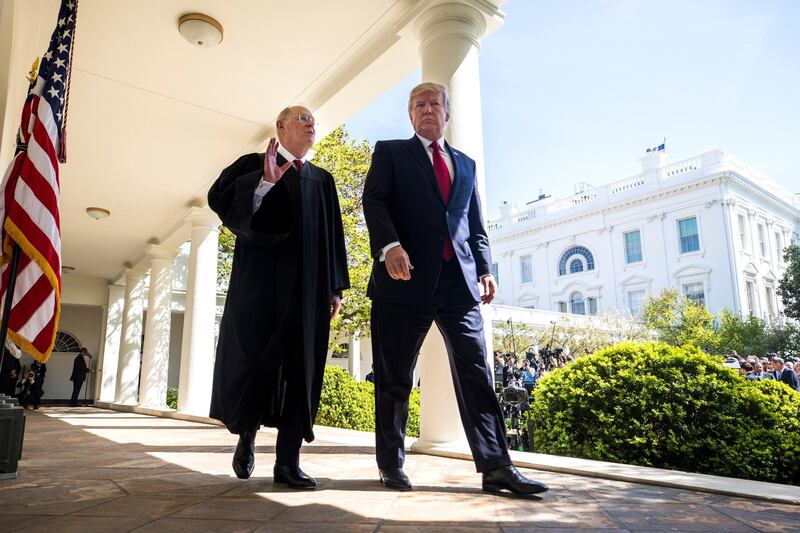The deadline is set and the casting calls have begun. One by one the hopefuls are meeting Donald Trump before he announces his selection for Supreme Court justice on Monday.
Once again the American president is using his love of reality television to drip details into the public eye, building suspense and turning a complex, constitutional decision into a piece of theatre that is already stoking division as opponents warn of deep, damaging consequences.
His choice could remain on the bench of America’s highest court for at least a generation, producing an impact that long outlasts Mr Trump’s presidency.
“I interviewed 4 very impressive people yesterday,” he tweeted on Tuesday. “On Monday I will be announcing my decision for Justice of the United States Supreme Court!”
His spokeswoman, Sarah Sanders, said the meetings lasted 45 minutes and that two or three more candidates would be interviewed.
The retirement of Justice Anthony Kennedy last week brought Mr Trump his second Supreme Court vacancy.
His appointment last year of Neil Gorsuch – drawn from a public shortlist of 25 vetted by right-wing groups such as the Federalist Society - brought him kudos from conservatives and even some praise from critics who welcomed the transparent selection process.
In that case, he replaced a conservative justice with a conservative justice. This time, Mr Kennedy was seen as a swing vote, balancing four liberal judges with four to the Right. Appointing a conservative could leave the court tilting to the Right for the next 30 or 40 years, said Jeanne Zaino, professor of political science at Iona College.
_________
Read more:
Judge's retirement heats up US midterm election battle
Trump hires lawyer who represented Bill Clinton in impeachment
Family separation protests flood US cities
_________
The appointment has the potential to shape court decisions on abortion, health care and gay marriage, she said, as well as issues of executive privilege and pardons that could be at the forefront of Mr Trump’s mind as he eyes the Mueller investigation into possible collusion between the Trump election campaign and Russia.
“It is the most important appointment to the court in probably half a century,” she said.
“From any perspective this is a critical moment in the Trump presidency and crucial to his legacy.”
In line with the reality TV style of the process, the names of the candidates have leaked into the public domain.
Each has their supporters.
Amy Coney Barrett, a 46-year-old mother-of-seven, has emerged as an early frontrunner. Insiders say Mr Trump has spoken of the historic nature of picking a woman and point out that she looks the part of a TV judge – another positive in Trump World - as well as coming with solid conservative credentials.
Newt Gingrich, former Republican speaker of the House of Representatives, has been talking her up on Twitter.
“Her clarity and intellectual strength in the Senate hearings for her current judgeship showed an intellect and a depth of thought that would be powerful on the Supreme Court,” he wrote.
Judge Amy Coney Barrett would make an outstanding Supreme Court Justice. Her clarity and intellectual strength in the Senate hearings for her current judgeship showed an intellect and a depth of thought that would be powerful on the Supreme Court.
— Newt Gingrich (@newtgingrich) July 2, 2018
All are federal appeals court judges. Brett Kavanaugh, helped independent counsel Kenneth Starr during the impeachment of Bill Clinton and he clerked for the departing Justice Kennedy; Raymond Kethledge, is also a former Kennedy clerk who graduated from the University of Michigan; and Amul Thapar, who was Mr Trump’s first judicial nomination to a district or appeals court and is a friend of the Republican leader of the Senate, potentially smoothing the confirmation process.
While the open nature of the process has helped Mr Trump show his evangelical and conservative supporters that the candidates are on side, it has also allowed Democrats to organise their opposition.
In particular, they fear a more conservative bench could upend the landmark 1973 Roe v Wade judgement which protects abortion rights.
A new group, Demand Justice, is reportedly planning to spend $5 million (Dh18.4 million) on a campaign to oppose Mr Trump’s pick. It plans to target its adverts in Maine and Alaska, home to two moderate female Republican senators, and in states represented by vulnerable Democrats in an effort to undercut Mr Trump’s wafer-thin 51-49 senate majority.
Susan Collins, the senior senator for Maine, has already said she would oppose any nomination she believed would overturn Roe v Wade.
Democratic senators have united under the #ditchthelist hashtag to demand the process be started again.
Kamala Harris, of California, wrote: “The American people deserve a Supreme Court justice who will fight to protect their rights, not conservative ideologues.”
However, Republicans are confident that they can steer Mr Trump’s eventual nomination through the confirmation process.
“I think there will be a big national, campaign rage. But in the end, I’m confident we’ll get the judge confirmed,” Mitch McConnell, the senate majority told reporters during an event in Ashland, Kentucky.
And for a president who has struggled to get legislation on to the books and made fighting America’s culture wars his priority, that is a big deal ahead of the 2020 election, according to Prof Zaino.
“He might not have been able to build the wall, but he will have fulfilled one of his promises to the base, and can say he has reshaped the court for 30 or 40 years to come,” she said.






